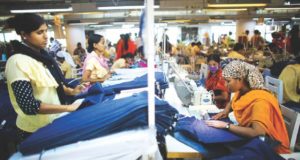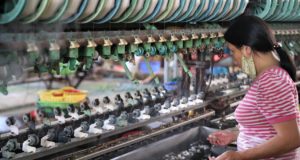Published in the Dhaka Tribune on 26, July 2017
‘If we cannot fully ensure favourable investment climate in the country, we should permit at least some big companies to invest beyond the border’
The country’s top business leader wants Bangladesh to invests in the US cotton sector as it seeks a return to the generalised system of preference (GSP) after a four-year hiatus.
Federation of Bangladesh Chambers of Commerce and Industries (FBCCI) President Shafiul Islam Mohiuddin said his proposal would see Bangladeshi firms manufacture garment products for the US market using the country’s own cotton.
Speaking as chief guest at a roundtable organised by the International Business Forum of Bangladesh (IBFB) on Tuesday, Mohiuddin said he had already raised the idea in a recent meeting with the US Ambassador to Bangladesh, Marcia Bernicat.
“Bernicat replied saying it’s a good idea and discussion can be initiated,” he said.
Dhaka wants to be readmitted to the GSP so it can broaden its export base and ease an over reliance on the garments sector. Former US President Obama hauled Bangladesh out of the special system of tariffs designed to favour developing countries after the Rana Plaza collapse in April 2013.
IBFB Director MS Siddiqui presented the keynote paper at the roundtable and called for an independent ‘Overseas Investment Cell’ to be formed to promote, facilitate and deal with overseas investment.
He said: “If we import one pound of raw cotton, it costs 60 US cents. If we produce it by own investment abroad, it will cost us only 10 US cents. Thus we can add more value to our products.”
FBCCI chief Mohiuddin also said Bangladeshi investors have “very good prospects in overseas investment”.
He said many African countries are offering land to the foreign investors and so Bangladeshi entrepreneurs can invest in various sectors including agricultural.
“It will ensure food and cotton security for Bangladesh,” he said.
Other speakers said overseas investment has the potential to increase efficiency in the use of productive resources, especially when facing infrastructural inadequacies at home such as shortages of adequate land, power and energy.
However, the roundtable warned that a failure by Bangladesh to take advantage of such opportunities may hamper GDP growth and poverty alleviation efforts.
The speakers suggested amending the Foreign Exchange Regulation Act 1947to liberalise overseas investment, establishing global financial integrity and electronic dashboard system, and strengthening the Financial Intelligence Unit with a view to controlling capital flight.
Research Director of Centre for Policy Dialogue Golam Moazzem urged the government to follow the overseas investment example of India.
“India started OFDI (Outward Foreign Direct Investment) gradually. We can follow their strategies. Initially, the Indian investors could invest up to $5m. But now they can invest up to $2bn in foreign countries,” said Moazzem.
“If we cannot fully ensure favourable investment climate in the country, we should permit at least some big companies to invest beyond the border.”
IBFB President Hafizur Rahman Khan presided over the second stakeholders’ roundtable on ‘Overseas Investment by Bangladeshi Entrepreneurs’ on Tuesday, while Bangladesh Investment Development authority (BIDA) member Ajit Kumar Paul was present as the special guest.
Ajit Kumar Paul said the BIDA is working to formulate a new policy regarding overseas investment.
“The draft of the new policy will be formulated soon and hope the policy will be helpful for the businesses. It will also preserve the country’s interest,” he said.
 CPD RMG Study Stitching a better future for Bangladesh
CPD RMG Study Stitching a better future for Bangladesh




